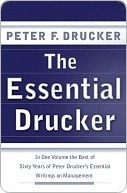More on this book
Community
Kindle Notes & Highlights
to make people capable of joint performance through common goals, common values, the right structure, and the training and development they need to perform and to respond to change.
True marketing starts out the way Sears starts out—with the customer, his demographics, his realities, his needs, his values. It does not ask, What do we want to sell? It asks, What does the customer want to buy? It does not say, This is what our product or service does. It says, These are the satisfactions the customer looks for, values, and needs.
It requires four sets of diagnostic tools: foundation information, productivity information, competence information, and information about the allocation of scarce resources. Together, they constitute the executive’s tool kit for managing the current business.
Reports and procedures should be kept to a minimum, and used only when they save time and labor. They should be as simple as possible.
Reports and procedures should focus only on the performance needed to achieve results in the key areas. To “control” everything is to control nothing. And to attempt to control the irrelevant always misdirects.
It motivates the manager to action not because somebody tells him to do something or talks him into doing it, but because the objective needs of his task demand it. He acts not because somebody wants him to but because he himself decides that he has to—he acts, in other words, as a free man.
To make an effective decision, an executive should look at three to five qualified candidates.
Discuss each of the candidates with several people who have worked with them.
Any job that ordinarily competent people cannot perform is a job that cannot be staffed.
set up the innovative project from the start as a separate business.
Cash flow, capital, and controls should be emphasized in the early stages.
one person also has to start learning how to work with colleagues, has to learn to trust people, yet also how to hold them accountable. The founder has to learn to become the leader of a team rather than a “star” with “helpers.”
What contribution from me do you require to make your contribution to the organization? When do you need this, how do you need it, and in what form?
The man who asks of himself, What is the most important contribution I can make to the performance of this organization? asks in effect, What self-development do I need? What knowledge and skill do I have to acquire to make the contribution I should be making? What strengths do I have to put to work? What standards do I have to set myself?
Just because something is difficult, disagreeable, or frightening is no reason for not doing it if it is right.
Knowledge workers are not paid for doing things they like to do. They are paid for getting the right things done
Before we can communicate, we must, therefore, know what the recipient expects to see and hear. Only then can we know whether communication can utilize his expectations—and what they are—or whether there is need for the “shock of alienation,” for an “awakening” that breaks through the recipient’s expectations and forces him to realize that the unexpected is happening.
The foundation of effective leadership is thinking through the organization’s mission, defining it, and establishing it, clearly and visibly. The leader sets the goals, sets the priorities, and sets and maintains the standards.
Trust is the conviction that the leader means what he says. It is a belief in something very old-fashioned, called “integrity.” A leader’s actions and a leader’s professed beliefs must be congruent,
politics is not about “who gets what, when, how” but about values, each of them considered to be an absolute. Politics is about “the right to live” of the embryo in the womb as against the right of a woman to control her own body and to abort an embryo.
But innovation, almost by definition, has to be decentralized, ad hoc, autonomous, specific, and microeconomic. It had better start small, tentative, flexible.
the need for continual learning and relearning.
because technology is an extension of human beings, basic technological change always both expresses our worldview and, in turn, changes it.


